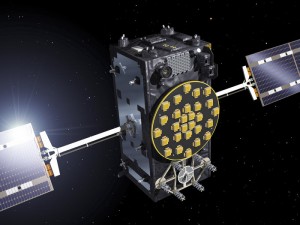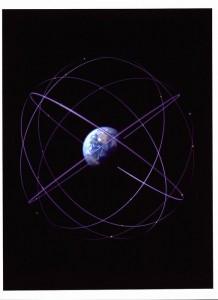And the European Space Agency is one of the pathogens. Every space program lays a few eggs, after all, and space launches are very difficult things, even 90-120 years after orbital satellites were originally conceived by Tsiolkovskiy, Goddard, and Oberth (in roughly that order, but more or less independently). But this is just embarrassing:
Everything started out looking great. At 9:27 am on Friday, August 22, a Soyuz rocket operated by Arianespace lifted off beautifully from French Guiana, making the ninth successful launch for the company using their Soyuz rockets. On board were two ESA Galileo satellites, the 5th and 6th of a planned 30-satellite constellation. …
Shortly after the two new satellites were placed in orbit, however, it became clear that something had gone wrong. Observations of the two satellites seemed to show that they were not in their targeted orbit.
“The targeted orbit was circular, inclined at 55 degrees with a semi major axis of 29,900 kilometers,” the company said in a statement. “The satellites are now in an elliptical orbit, with excentricity of 0.23, a semi major axis of 26,200 km and inclined at 49.8 degrees.”
The Galileo program is a European vanity program duplicating the capabilities of the US Global Positioning System (GPS) and the Russian Globalnaya Navigatsionaya Sputnikova Systema (GLONASS).
Yes, the satellites they put in the wrong place are navigation satellites. There’s something meta in that, eh? They were the first two Full Operational Capability Galileo sats, and the ESA is trying to figure out whether anything can be saved from their launch.
Now, there are benefits to another sat constellation, of course: a system which could use all the available sats from all three operators (the Chinese also have their own system, Beizhou/COMPASS, so there are potentially four satellite constellations) would have many more above-horizon sats to work with, maybe a dozen. That means higher accuracy than a single-constellation nav receiver can manage, and it means fewer coverage gaps and terrain / structure shadows. And the orbits of the Galileo satellites are, on average, more highly inclined than their competitors, suggesting that Galileo might have better coverage in the Arctic than GPS or (surprisingly) GLONASS.

Kevin was a former Special Forces weapons man (MOS 18B, before the 18 series, 11B with Skill Qualification Indicator of S). His focus was on weapons: their history, effects and employment. He started WeaponsMan.com in 2011 and operated it until he passed away in 2017. His work is being preserved here at the request of his family.



14 thoughts on “Europe is the Sick Man of Europe”
This is what happens when your space program is a combination of the cream of Soviet engineering, and the half-hearted efforts to crib the key processes and components based on Cliff Notes about NASA when it was still run by engineers and visionaries, written by bureaucrats and publicists.
Until they get to the point where they’re killing people by trying to pus the envelope and do hard things, they won’t be learning anything. Performing a triple axel requires falling on your ass 10,000 times, according to an Olympian of past acquaintance. So far, they’ve only reached the stage of screwing up the simpler stuff. And unlike us, at least they’re still trying.
The only noteworthy part of their efforts was waiting until the major players have gotten past the “let’s all kill each other in another pointless war” stage of their existence. Which is something, however fleeting that achievement may be.
Firstly, the rocket on which it was launched was of Russian origin. They killed busloads of people while developing their rockets.
Secondly, I question the need for blood sacrifices in engineering.
I kind of doubt Soyuz rockets are going to be used by ESA in the future, now that Russia has taken up the bad habit of military interventions in foreign countries for stupid reasons.
FYI, half of the world’s commercial satellites were launched on Ariane rockets. Developed by Arianespace, a joint venture between Airbus and about 10 european space agencies.
They’ve had something like 285 launches since early 1980’s…
😉
Yeah. Screwing up on simple stuff… that’s all they’ve managed so far. Right.
US has got SpaceX. Which has managed to develop reliable launch vehicles without relying on taxpayer money. They seem to be doing fine and taking away some business from the traditional contractors.
IMO, very good news for US space programs. The traditional suppliers of launch vehicles, Lockheed and so on are quite costly.
Question the need for blood sacrifices in engineering all you like.
You don’t know you’ve gone too far until you’ve gone too far.
As ESA has never put any skin in the game on their own rockets, they aren’t likely to advance much farther than minimizing the failures of a forty year old design.
While the Russians have and will probably continue to kill busloads of people with their rockets, nota bene that the qualifier was “by pushing the envelope”.
They may be pushing their own envelope of space competency, but that’s a rather low bar to judge by compared to the absolute record.
And the Ariane has performed only 217 launches, zero manned, which rather pales in comparison to the 669 launches by NASA before Ariane ever flew, including 31 manned missions to space, and delivering and retrieving 12 men to walk on the moon. So far no one else is in second place on that score.
While Space-X’s accomplishments are laudable, they are a private corporate venture. One can no more count them as national triumphs than point to the excellence of an Intel chip or a Ford race car. Call me when they surpass what was done by guys at NASA who are so old now that they’re dropping like flies from the relentless march of the actuarial tables, and while using mechanical slide rules, and television was still mostly in two colors: black, and white.
NASA has been parked since 2011 for anything more strenuous than what Ariane and the ESA has been doing since 1979, and we haven’t put anyone outside of earth orbit since 1972 (nor has anyone else).
So no, we aren’t still trying, and yes, fucking up satellite payload missions still puts ESA at the point NASA had reached by about the middle 1960s, a mere fifty years before now.
Not much more than fifty years before that, the Wright brothers were still demonstrating manned aerial flight, while the French had only recently admitted French claims to the contrary were mere fits of jealous jingoistic pique.
The rocket doesn’t care whether it’s carrying a canned great ape or not. Launching a manned mission reliably is not much more of an engineering challenge than doing the same with an unmanned craft.
‘Commercial’ launches. If Arianespace was consistently ‘fucking up launches’ as you say, how come they managed to attract so much business?
The much-vaunted Moon landings have actually killed any hope for a true space program. The money spent on that publicity stunt, necessary as it may have been pre-empted spending that money on say, Orion-drive civilian or military spacecraft.
Furthermore, what was accomplished was basically giving a former high ranking SS-officer enough money to just scale up his old ballistic missile projects.
There is no good reason why rockets can’t be launched from say, maglev catapults. Or a large gas gun. Or a very large, high-flying aircraft.
Except that every design ever built by a state agency was basically either an ICBM or a scaled up ICBM.
The rocket doesn’t care whether it’s carrying a canned great ape or not.
The people who pay for the rocket care. Amateurs talk tactics, etc.
Launching a manned mission reliably is not much more of an engineering challenge than doing the same with an unmanned craft.
Only if one takes the Soviet view on crew expendability.
So we can believe that statement, or read the history of NASA in the 1960s, and note that 40 years later, ESA has yet to put anyone up there except via ride-alongs, and has no plans to do it nor try this side of Hell getting frosty.
If Arianespace was consistently ‘fucking up launches’ as you say, how come they managed to attract so much business?
If only I’d added the word you did, “consistently” there’d be a point to that riposte.
The Ariane is relatively reliable bus for payloads. And yet, even on such a reliable bus, older than most Hollywood actresses working, they still can’t get to even 95%, because $#!^ happens. It’s a good thing there were no astronauts on the ride this last time, or they’d be another can of spam for the “pride of Soviet engineering” tally, wouldn’t they?
The much-vaunted Moon landings have actually killed any hope for a true space program. The money spent on that publicity stunt, necessary as it may have been pre-empted spending that money on say, Orion-drive civilian or military spacecraft.
Furthermore, what was accomplished was basically giving a former high ranking SS-officer enough money to just scale up his old ballistic missile projects.
Gotcha. A “true” space program.
The one to send up detection apparatus to find Bigfoot, no doubt?
Columbus’ voyage, the Wright Brothers, and Lindbergh’s flights were also “publicity stunts”, no doubt. People would be clamoring to get on board an interplanetary mission given a dearth of any experience going with live people even as far as that easy-to-reach moon landing, under your theory of the engineering being relative child’s play.
Carp ad hominems about von Braun all you like. Ariane exists because of his work, and that of his colleagues who went East as well as West after WWII, depending on who captured them in 1945. You can gainsay the results, but you can’t change those facts.
Give a holler when someone walks on the Moon without an American flag on their sleeve. Be sure and get your grandkids interested in monitoring developments. So far unmanned equatorial orbits seem to be far too technologically challenging.
Putting anything in space is hard. Putting people there is far harder. And so far, there’s only one space program anywhere that ever even made it look easy. And you know what we got? Bored.
You don’t need Orion vehicles for that, conventional spy satellites would suffice, provided they can see in infrared. There would be many more of them flying though, had US chosen the correct program.
Apollo was a dead end. Followed by the Shuttle, a pinnacle of design-by-committee and pork barrel economics.
Europe is the Sick Man of Europe
..yeah, it’s all single country. There is no difference between, say, Greece and Germany, or say, the countries involved in Nafta.
Just like it’s totally not true that US allocates more funds to welfare than most EU countries, excepting such welfare paradises as Sweden and the UK..
Because most of the world’s developed countries can totally afford to rely on the whim’s of whatever Democrat emperor-president US is going to choose next.(Demography strongly favors the Democrats unless you’d say, disenfranchise women. Like that’s gonna happen.)
We can totally expect not to have GPS shut down for some bullshit reasons, as say, mistreatment of refugees. UNHCR is already screaming about Greece towing back boatloads of migrants out of it’s territorial waters. In between complaining about conditions in Greek illegal immigrant detention centers not being good enough. And we all know how welcoming the Federal Gov’t is when it comes to illegal immigrants…
US borders Mexico. EU southern borders on all the dysfunctional Arab Med countries where arresting economic migrants is a very low priority. Consider that there’ll be 1.5 billion Africans by 2050, and that even African countries with lots of oil revenue (Nigeria, for example) can’t even manage to keep the electricity on reliably.
Yeah. But ESA has never lost a very expensive probe because of insistence on using antiquated and silly units in serious applications way past their time..
I thought the headline was clear that “Europe,” i.e. such pan-European institutions as ESA and the clown show that is the European Parliament, was the sick man of Europe. I probably should have put the scare quotes in the headline.
Imagine how jacked up the migrants’ homelands are, if they’re going to Greece as a step up. Like California, it has a lovely coastal climate and a level of economic management & political chaos that would leave Juan Perón shaking his head. Of course, the migrants know if they get feet dry in any EU nation, they can then internally migrate to wherever the welfare cushion is cushiest.
Pretty much every legislative body elected through a universal franchise is a clown show.
Has it’s uses though, it’d be pretty insane to let European Commission propose and approve laws to which EU wide laws would consequently have to conform.
So far, it has caught some bad stuff. It can’t propose legislation though, just stop it.
It’s similar with the EU. It has it’s uses, standardisation, free trade, easy travel and so on are all good things, however, there’s stupid stuff like the agricultural policy, extremely complex bureaucracy and so on.
Still, possibly better than the alternative, which would be a major war every couple of decades. That’s the other European tradition.
Look at our demographics. Look at the unfunded liabilities (not referring to our bloated “civil” service or the multiple caked layers of “parliaments”, those are overfunded). I’d rather not look at all the internal economic migrants that are flooding into my workplace, but the solution to that is in the pipeline. Homo Sovieticus is not a nice person to have around you, which simply validates the concerns of those that wanted the borders kept closed and the EU to wither on the vine. Speaking of pipelines, this winter might be an interesting one, considering Vlad has his hand on the gas tap, followed closely by a Ukrainian hand on the valve downstream of that. Our other sources of heat are also not free of peculiar worries of late. Methinks a tripling of the stockpile of kero, and woolens, is in order. As to Euro nav satellites going wonky on a Russian launcher, well, how sad, tsk tsk. An unfortunate regrettable mishap. I wonder how the ISS crew feel about their taxi and pizza delivery service having such a conniption.
Returning to the original topic, isn’t it true that where you have a hardware screw-up, there’s often a software workaround?
I’m looking at you, Hubble…
Fixing Hubble also required sending people up there to fiddle around with it on an in-person service call or three, IIRC.
Fortunately, we eliminated our own capability to do any more of that 3 years ago, and no one else has ever had it.
The closest equivalent to the current official US attitude about space missions would be Spain deciding in 1493 that the Columbus voyage was a bust, “nothing there but mosquitoes and pre-literate natives”, and going back to perfecting the spice route around Africa.
Yes they did send astronauts up to insert two secondary mirrors to correct the primary mirror, which was ground to the wrong configuration. But I’m referring to what they did before that – when they improved the photos by knowing that the curvature was wrong and using computers to ‘deconvolute’ the spherical aberration, of rays from point sources by computing the inverse of the spread of their rays and reassigning different values to the image pixels.
By the same token, if I were project manager of Galileo, I’d be telling everyone, “Look, our satellite tracks deviated from our plans, but don’t panic, we know where they ARE! And their paths are quite predictable. So all we need to do is apply a software patch that recomputes the phase delays expected from their new positions at any point in time, and voila! – we’ve got the GPS nailed.”
Yes, it’s fun schadenfreude to see others screw up, but on the bright side, if the Chi-coms want to incapacitate the US GPS, we could just ‘borrow’ the Galileo signals ourselves.
Maybe it’s the surgeon in me, but when ‘mistakes were made’ (never say Oops in the OR), we didn’t just go home and cry in our beer. Amateurs may quit, but professionals compensate.
Are the EUropeans professionals? We’ll see…
If you were project manager for Galileo, it would mark the return of someone with a sense of the mission to run anything at NASA in 30 years, along with feeling the application of the normally Japanese zen they last experienced under Gene Kranz: “fix the problem, not the blame.”
They’re generally too busy hiring bean-counting PR spin-meisters to bother with the barest appreciation for both technological complexity, and visionary explanation of any general and specific purpose.
NASA is now run by Doctor Zachary Smith, which explains why the entire enterprise is “Lost In Space”, and why things like X-Cor and Space-X are even around, let alone set to surpass NASA sooner rather than later. NASA has become nothing but a federal jobs program for window-licking paste-eaters. They should simplify the chain of command, and just turn it over to the US Post Office.